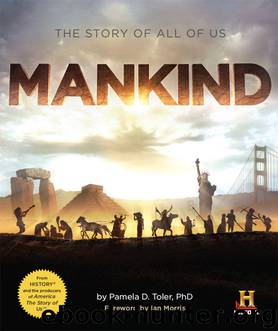Mankind by Pamela D. Toler

Author:Pamela D. Toler [D. Toler, Pamela]
Language: eng
Format: epub
ISBN: 9780762447176
Publisher: Running Press
The Ottoman Turks capture Constantinople in 1453. Engraving by Matthäus Merian the Elder (1593-1650)
On the morning of May 29, three hours before dawn, the Ottomans began an all-out attack on the city. Sixty-eight cannons. Five thousand cannonballs. Fifty-five thousand pounds of gunpowder—enough to put a rocket into space. The great cannon blasted a hole through the outer wall that had protected Constantinople for more than a thousand years. The Anatolian infantry poured into the city through the gap. They were slaughtered in the narrow space between the inner and outer walls by the city’s defenders, led by the emperor himself. The resistance was fierce but short-lived. The Byzantines, in turn, were trapped between the city walls when they were hit by a shower of arrows from Ottoman janissaries who had climbed the outer stockade. The Turks were already climbing the inner wall when they saw their flag flying from one of the inner towers; a small group of Turkish soldiers had found a small side gate that had been left open and entered the city without challenge. Constantine XI attempted to rally his forces at the breach and died in the final defense. Within hours, the Ottomans had control of Constantinople. Mehmet had employed gunpowder-fired weapons on an unprecedented scale to take his prize.
The last relic of the ancient world was dead.
Western Europeans reacted with a mixture of shock and fear. The news reached Venice first, on June 29, 1453. Constantinople had been home to more than ten thousand Venetian merchants and their families. All the Venetians in Constantinople had been either enslaved or killed. According to an eyewitness, Venetians greeted the news with “great and desperate wailings, cries, and groans, everyone beating the palms of their hands, beating their breasts with their fists, tearing their hair and their faces.”
From Venice, the news rippled across Europe within a year and became the subject of widespread lamentation. It was felt to be the end of something. It tilted the world onto an unpredictable axis.
Long-established assumptions and beliefs fell with Constantinople. It was the last remnant of the classical world. It was the buffer against the Islamic world. It was the last Christian foothold in the eastern Mediterranean. It was the best launchpad for the long-cherished hope of recapturing Jerusalem. All these things died in 1453. Christendom was no longer united enough to push back the Turks. The classical world was emphatically dead. The age of the crusades was over. The world of medieval chivalry was being replaced by the era of gunpowder. The Ottomans were permanently established in Europe. They were moving closer.
With this realization came the fear that the Turks might conquer the world. Suddenly Europeans could feel the hot breath of Islam on their collars. “The enemy is at our gates!” wrote an Italian. “The axe is at the root. Unless divine help comes, the doom of the Christian name is sealed.” Mehmet was identified with the Antichrist: implacable and unstoppable. “Mehmet will never lay down arms except in victory or total defeat,” wrote Pope Pius II in 1459.
Download
This site does not store any files on its server. We only index and link to content provided by other sites. Please contact the content providers to delete copyright contents if any and email us, we'll remove relevant links or contents immediately.
| Africa | Americas |
| Arctic & Antarctica | Asia |
| Australia & Oceania | Europe |
| Middle East | Russia |
| United States | World |
| Ancient Civilizations | Military |
| Historical Study & Educational Resources |
The Daily Stoic by Holiday Ryan & Hanselman Stephen(2703)
The Fate of Rome: Climate, Disease, and the End of an Empire (The Princeton History of the Ancient World) by Kyle Harper(2431)
People of the Earth: An Introduction to World Prehistory by Dr. Brian Fagan & Nadia Durrani(2345)
Ancient Worlds by Michael Scott(2098)
Babylon's Ark by Lawrence Anthony(2066)
Foreign Devils on the Silk Road: The Search for the Lost Treasures of Central Asia by Peter Hopkirk(2053)
India's Ancient Past by R.S. Sharma(1982)
MOSES THE EGYPTIAN by Jan Assmann(1968)
The Complete Dead Sea Scrolls in English (7th Edition) (Penguin Classics) by Geza Vermes(1837)
Lost Technologies of Ancient Egypt by Christopher Dunn(1796)
The Daily Stoic by Ryan Holiday & Stephen Hanselman(1764)
The Earth Chronicles Handbook by Zecharia Sitchin(1742)
24 Hours in Ancient Rome by Philip Matyszak(1675)
Alexander the Great by Philip Freeman(1643)
Aztec by Gary Jennings(1541)
The Nine Waves of Creation by Carl Johan Calleman(1518)
Curse Tablets and Binding Spells from the Ancient World by Gager John G.;(1509)
Before Atlantis by Frank Joseph(1482)
Earthmare: The Lost Book of Wars by Cergat(1465)
